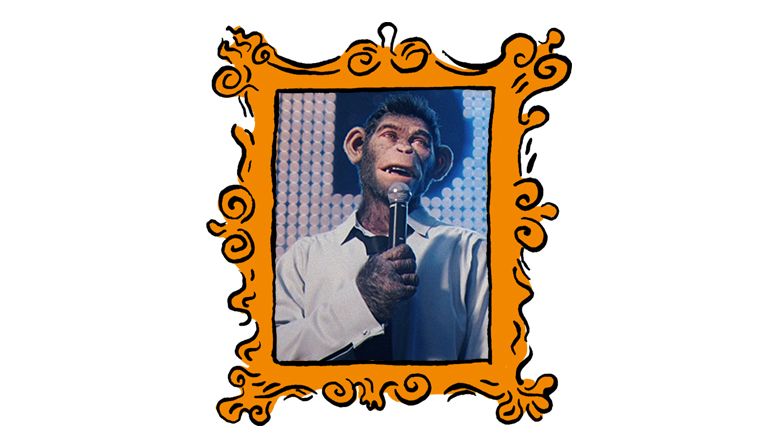The much-hyped Robbie Williams biopic Better Man was released in British cinemas just after Christmas and has resoundingly underperformed. After two weeks on release, it’s made £3.8m at the box office. By contrast, the Queen biopic Bohemian Rhapsody (2018) had earned over £20m in a similar timeframe, and the Elton John picture Rocketman (2019)—a better comparison, because of its relatively frank sexual content and fantastical flourishes—made around £12m. But neither of them featured a photorealistic talking chimpanzee as their protagonist.
To its credit, Better Man hasn’t shied away from its unique (and bizarre) raison d’etre, with Williams voicing his own simian on-screen representation: it’s been front-and-centre in the marketing and has attracted a warm degree of critical praise, as it gives what might have been an otherwise rote musical real interest and vitality. When I saw it at a virtually empty cinema, I couldn’t deny the ballsiness of Michael “Greatest Showman” Gracey’s picture, nor its very English black humour that stands at odds with its Australian cast, director and filming location. But it’s still a film about Robbie Williams—a hugely successful but divisive figure—that stars a talking monkey.
If the film had been budgeted at around $40m—the same cost as Rocketman—Williams’s international fanbase would have eventually helped it to break even. Unfortunately, Better Man’s cutting-edge special effects, as well as some magnificently overwrought musical numbers (“Rock DJ” staged as a mass celebration on Regent Street has to be seen to be believed), caused its budget to spiral to $110m. And although it’s being distributed internationally by Paramount Pictures, it was produced and financed independently by a series of Australian production companies, with considerable funding from the government’s incentive schemes.
“Independent film” usually suggests some low-budget picture full of mumbling, where the most exciting special effect is a dropped coffee cup. However, three high-profile 2024 releases all worked against this notion. As well as Better Man, Francis Ford Coppola’s decades-in-the-conception Megalopolis—which Coppola financed himself to the tune of over $100m by selling off part of his Californian wine business—premiered at the Cannes film festival to breathless anticipation from cineastes who hoped that the Godfather (1972) director had pulled off one last masterpiece. The strangely arch and mainly incomprehensible result was not only a disappointment, but also suggested that studios had passed on funding Coppola’s passion project for sound commercial reasons. It limped to $14m at the global box office—and will join other Coppola flops, such as One From The Heart (1981) and The Cotton Club (1984), as another example of what happens when untrammelled ego meets funding.
Kevin Costner’s Horizon also debuted at Cannes. At first glance, this was a more modest project than the other two, being Costner’s latest and commendable attempt to rehabilitate the screen western, budgeted at a comparatively tight $50m. Unfortunately, here, too, lay grandiosity. Costner announced that Horizon—fatefully subtitled An America Saga—would consist of four three-hour parts and they would be largely self-financed, to the tune of $38m, with additional funding being provided from shadowy sources. The first two parts premiered last year, to critical and audience indifference, and Costner, undaunted, is continuing to make the third film in the series, although he has also commented that “I don’t know how I’m gonna make it right now, but I’m gonna make it.”
Well, Kevin, we shall see. One appealing quality that he shares with Coppola and Gracey—three filmmakers who otherwise have little in common—is that, in an industry increasingly focus-grouped to distraction and averse to risk-taking on a grand scale, they have dared to venture outside of studio-based orthodoxy in favour of something wildly ambitious and original. It is unfortunate that all of their films have flopped, and flopped resoundingly. Certainly, the boldness and (largely) successful execution of Better Man deserved a better fate. But audiences are showing up for fewer films these days, and most of them would rather see Wicked or Moana 2.
All is not lost, however. The big winner at this year’s Golden Globes, and the frontrunner for the Oscars, is Brady Corbet’s The Brutalist, a big, sprawling epic that has been favourably compared to The Godfather and There Will Be Blood (2007) in its saga of Adrien Brody’s tormented architect in post-Second World War America. Corbet financed the film independently and it has received rave reviews for his direction, as well as acclaim for its starry cast including Guy Pearce and Felicity Jones.
But the total cost? Somewhere slightly below $10m. The lesson is surely clear: originality and chutzpah still count for something, even in contemporary Hollywood, but if you want your film to succeed, slash the budget. Only then do you stand any chance of success. Otherwise, to quote one of Williams’s many hit singles, you will inevitably come undone.
Is this the end of risk-taking independent filmmaking?
Cinemas have recently played host to madly ambitious movies by Robbie Williams, Francis Ford Coppola and Kevin Costner. But audiences haven’t turned up
January 09, 2025









